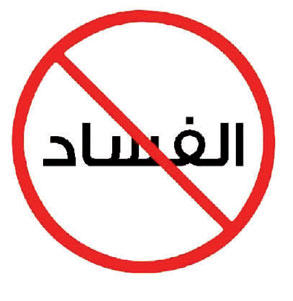In recognition of the International Anti-Corruption Day, Democracy and Human Rights and Democracy Media Center- SHAMS, urges for excise such a phenomenon from its roots as it leads to destroy the entire community and affects people’s belonging to their country. The Corruption transfer people into passive citizens where they become careless about general issues and they withdraw from public life. At the same time, corruption creates a fertilized soil for crime, which will affect people’s social, economic, and political lives. Citizens usually are dominated by the feeling of alienation once corruption dominates the community. The social fabric and social cohesion are damaged within the contexts where corruption spreads. Combating corruption is a tool to motivate people and develop their country as well as strengthen commitment to the law. Likewise, it contributes to enhancing the principle of positive citizenship among the various social segments. Combating corruption contributes to strengthening the relationship between citizens and the state institutions. Additionally, it enhances the belonging of citizens to their country and they feel that they are responsible towards the country, which will enable people to develop their self-assertiveness. Combating corruption became a requirement to achieve political, social, and economic development.
SHAMS Center, in recognition of the International Anti-Corruption Day, which the United Nations General Assembly adopted to be on December 9, annually, affirms the necessity to combat corruption. The General Assembly adopted the International Day to draw attention to the negative impacts of corruption and develop the required tools to combat such a phenomenon. International Anti-Corruption Day was adopted through The United Nations Convention against Corruption endorsed on 30/11/2003, to which 190 states acceded. The Convention affirmed the importance of integrity, accountability, and good governance as well as strengthening the efforts adopted to eliminate corruption and enhancing the international cooperation in this field in addition to enhancing the good management of public affairs on the international level.
SHAMS Center calls upon creating a community culture against corruption and enhancing the principles of integrity, good governance, and accountability. Achieving that could be through endorsing these values and principles within the educational process in schools and universities. There is a need to establish a specialized unit within the official institution that could be associated with promoting the principles of integrity and raising awareness about the impacts of corruption on the institutions and the entire community. There is a need to focus on auditing the governmental and civic institutions to ensure that there is no corruption inside them. Such a step will contribute to enhancing the development and progress of these organizations and developing their administrative structure. Through monitoring and auditing, it is possible to discover the weak points and structures, which might enable the spread of corruption it is possible to enhance accountability for corruption as well as achieve real development.
SHAMS Center emphasizes the importance of implementing all laws, regulations, and systems related to combating corruption in Palestine, most notably Law No. (1) of 2005 and its amendments. Additionally, the Government Decision No. (7) of 2019 concerning the protection of witnesses, whistleblowers, and informants about corruption, and providing them with legal and physical protection. In this regard, there is also the Government Resolution No. (1) of 2020 regarding the disclosure of conflicts of interest, which emphasized enhancing the values of transparency, professionalism, and accountability, and preventing conflicts of interest, whether directly or indirectly. Despite the existence of a Palestinian legal regulatory system to combat corruption, many obstacles and reasons are preventing the implementation of these systems and legislation and the performance of Palestinian regulatory institutions in exercising their effective role in supervision, evaluation, monitoring, and accountability. This is due to many reasons, including administrative, financial, political, and legal issues. The most important of these obstacles is the absence of the Palestinian Legislative Council and its failure to legislate and its lack of supervisory role over specialized institutions.
The Center emphasizes that combating corruption in the community has become, in today’s world, a fundamental tool and pillar of development, especially in democratic countries worldwide. Combating corruption, with its means, tools, mechanisms, and the participation of all social sectors, including individuals, parties, civil institutions, media organizations, and official oversight institutions, has a positive impact on the community. Here, the need to activate the work of monitoring institutions to combat corruption, especially the Anti-Corruption Commission, the Office of Financial and Administrative Control, and the Public Prosecution, becomes apparent. It is also essential to conduct elections for the Palestinian Legislative Council, which represents the primary monitoring body over the actions of the executive authority, and to emphasize compliance with the Palestinian Basic Law by separating of authorities.
The Center calls for the revival of democracy and the holding of presidential and legislative elections. The absence of democratic life in Palestine, the obstruction of the legislative council’s work, and the failure to hold legislative and presidential elections within the specified constitutional deadlines have had the greatest impact on the spread of corruption, the absence of accountability and the enforcement of the law. The primary task of the Palestinian Legislative Council is to enact laws, monitor the work of the executive authority, and ensure its compliance with the laws and regulations. The absence of the Palestinian Legislative Council has also resulted in a lack of monitoring, accountability, and enforcement.

